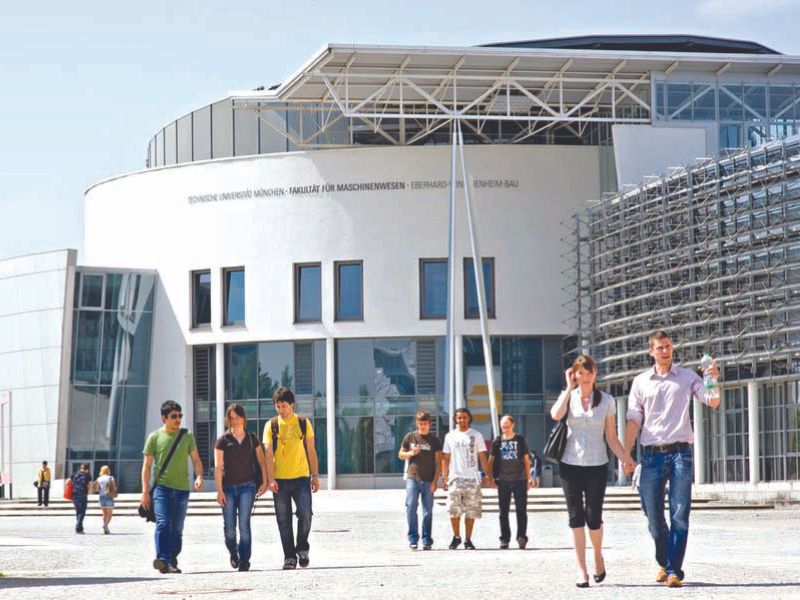Technical University of Munich
A public research varsity which doesn’t charge tuition fees for domestic and international students, TUM is ranked among the Top 50 universities worldwide by THE and QS, writes Reshma Ravishanker

ONE OF THE OLDEST UNIVERSITIES OF Germany, the Technical University of Munich (TUM, estb.1868) is internationally reputed for its high-quality academic and research programmes in engineering, life and natural sciences. A public research varsity, which doesn’t charge tuition fees for domestic and international students, TUM is ranked #30 in the latest Times Higher Education World University Rankings (WUR) 2022-23 and #49 in the QS WUR 2022-23. TUM which boasts the tagline — ‘the entrepreneurial university’ — is also a hub of business start-ups with 74 enterprises incubated last year. Unsurprisingly, Sifted — a web portal of the London-based Financial Times — ranks TUM #6 in Europe for graduating the most unicorn promoters in the continent. Nine companies founded by TUM alumni are featured as “future unicorns” in Europe’s Top Unicorn Universities list.
Founded in 1868 by King Ludwig II of Bavaria, TUM admitted its first batch of 350 students and 24 professors in its inaugural year. In 1901, it was conferred the right to award Ph D qualifications. During World War II (1939- 1945), 80 percent of the university’s Munich campus was destroyed and teaching-learning suspended. In 1946, the university reopened and gradually rebuilt its impressive infrastructure and facilities.
Currently, TUM’s eight schools (computation, information and technology; engineering and design; natural sciences; life sciences; management; social sciences and technology) offer undergrad, postgrad and doctoral programmes to over 50,000 students mentored by 7,000 faculty. With 40 percent of its students from abroad, TUM offers 76 degree programmes in the English medium. Alumni include 18 Nobel Prize winners. Among them: Hans Fischer (1930 for chemistry), Joachim Frank (2017, chemistry) and Anton Zeilinger (2022, physics).
Munich. The capital of the state of Bavaria, Munich (pop. 6 million) is Germany’s third largest city after Berlin and Hamburg. Straddling the River Isar (a tributary of the Danube) north of the Bavarian Alps, the city is a global hub of engineering, technology, automobile, and creative industries. It hosts the head offices of several multinational corporations including BMW, Siemens, MAN, Allianz and Munich RE. In the latest QS Best Student Cities Rankings 2022, it is ranked #2 worldwide.
The city is also a hub of arts, music and culture and hosts several international festivals through the year. Moreover it hosts some of the region’s largest breweries, and is known worldover for its annual Octoberfest.
The city has a continental climate with warm summers (240-350 C) and freezing winters with the mercury dipping to -40 C year end.
Campus facilities. TUM’s main campus in Munich is supplemented by regional campuses in Garching, Weihenstephan, Straubing, and Heilbronn, and an international campus in Singapore. The historic Munich campus is sited in the heart of the city between the Konigsplatz and Pinakotheken art museums and hosts the university’s schools of engineering and design, management, social sciences and technology and the department of electrical and computer engineering. State-of-the-art classroom and lab facilities and a three-floor library apart, students have access to students’ union cafes and numerous restaurants sited in Munich’s university district.
Garching, the largest and most modern TUM campus, hosts the varsity’s natural sciences and engineering faculties; Weihenstephan, the life sciences campus in the 1,200-year-old cathedral town of Freising and Straubing the Integrative Research Centre. Inaugurated in 2018, when the university was celebrating its 150th anniversary, the newest Heilbronn campus was primarily funded by a donation of over €100 million (Rs.800 crore) from German supermarket tycoon Dieter Schwarz. All campuses offer excellent sports, health and fitness facilities.
Admission. The minimum eligibility criteria for admission into TUM’s undergrad programmes taught in English are completion of class XII and proof of proficiency in English language (IELTS score of 6.5-plus or TOEFL score of over 88). Admission into TUM is highly competitive with the acceptance rate around 8 percent.
Indian students except those who have passed the class XII school-leaving International Baccalaureate Diploma Programme (IBDP), are required to undergo a preliminary review documentation (VPD) evaluation by Uni-assist before applying to TUM. Uni-assist processes international student applications as an external partner for TUM. Subsequently, the final VPD has to be uploaded in the application form on TUMonline. The application deadline is July 15 for semesters beginning October.
For admission into postgraduate programmes offered in English, the eligibility requirements include a bachelor’s degree and proof of proficiency in English. The admission process also involves aptitude assessment and interview. Though proficiency in the German language is not mandatory for admission into English-taught degree programmes, students are advised to learn basic German for ease of living in the city.
For further information, call +49 89 289 22245; email: [email protected] or visit www.tum.de.
Accommodation. TUM doesn’t offer on-campus accommodation. However, university staff support students to find accommodation by providing personal advice, in-house listings and other useful information. Housing options include halls of residence run by the Munich Students’ Union and social and private organisations, and private flats.
Degree programmes. TUM’s eight academic schools offer 182 degree programmes including 76 in English (see box).
SCHOLASTIC OPTIONS AT TUM
TUM offers 76 degree programmes in the English medium. Among them:
Undergrad programmes. Aerospace engineering, electronics and data engineering, management and technology, information engineering, sustainable management and technology, technology and management-oriented business administration
Postgraduate. Aerospace engineering, agricultural biosciences, agricultural sciences and horticultural sciences, automotive engineering, architecture, civil engineering, bioinformatics, mathematics in operations research, landscape architecture, mathematical finance and actuarial science, land management and geospatial science, robotics, cognition and intelligence
Tuition fees. A fully publicly-funded university, TUM doesn’t charge tuition fees to domestic and international students. However, semester fees ranging from €92-138 are payable.
Living expenses. €800-1,400 per month
NB €=Rs.81.62

















Add comment